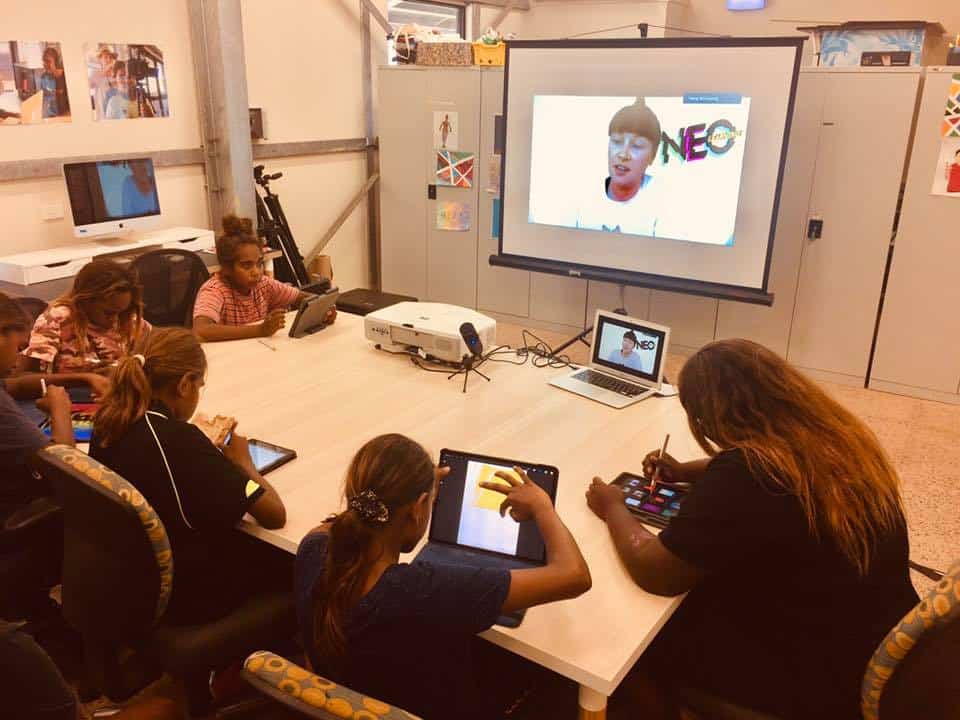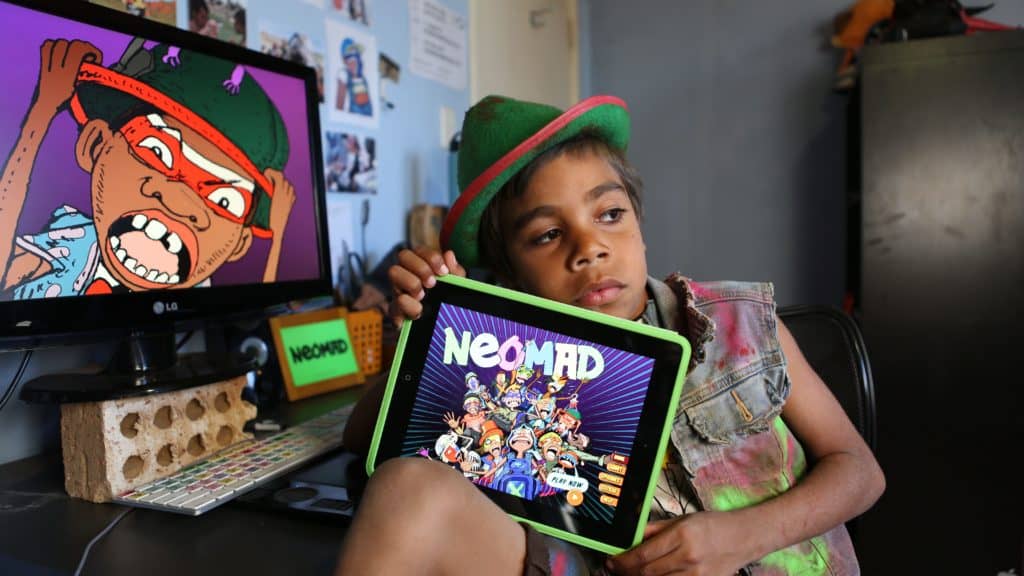Photo by Leith Alexander, courtesy of Big hART.
“Against the unpredictability, against the chaotic uncertainty of the future, the remedy lies in the ability to make and keep promises.”
– Hannah Arendt.
In my role as CEO of the Arts and Social Change organisation Big hART – an Australian Arts and Social Justice not-for-profit working with vulnerable people – I’ve watched COVID-19 drastically reduce revenue leaving workers and participants in a precarious position. What should we do? Hibernate? Make the hard decision to hang on? Shut down and return to the isolated safety of our own homes?
Maybe Big hART’s work doesn’t sound all that important – it’s just the arts – why not shut down till after the pandemic? Well, it’s not just the arts. Some days it is life and death. It means avoiding crime, or staying in school. It is mental health, and maintaining social connection. It means avoiding family violence. It is vital work keeping disenfranchised youth socially connected. Since 1992 Big hART has worked across Australia with communities experiencing diverse forms of disadvantage – rural young people disengaged from education, young people and family violence, young offenders and remote Indigenous communities, and more.
Usually, when young people come to Big hART workshops, they are hungry. We feed them toasties and fresh fruit, so they can concentrate. Then we feed them literacy, digital skills, self-esteem, catch-up learning, movement, art. After they’ve finished their workshops, we drop them home with full bellies, happier with achievements, beaming with self-esteem. We concentrate on dropping them to safe spaces – watching for body language if the wrong car is in the drive. Sometimes there’s violence, or addiction – feeling unsafe – and they’ll want the safety of the basketball courts.
Now the Government instruction is “go home and stay home.” In one Aboriginal town where we work in Western Australia, “go home and stay home” often means home to hunger, danger, assault, overcrowding, disengagement, addiction to grog (alcohol) or ICE, and sometimes crime to try and buy food to feed your kids.
Government says, “home school.” But our experience tells us that learning is simply not an option without supported, one-on-one programs. This is what Big hART provides – engagement, self-expression through music, video, photography, animation, dance, an expression of their story, building agency, visibility and safety. Drawing them back into social-participation, “catching up,” and staying in reach of the digital economy. We know highly at-risk young people can’t just hibernate. Deprivation doesn’t wait. Our work is an essential service – getting nutritious food into bellies. Education. Data. Appropriate online resources, not ‘one size fits all’. Mostly, we need to remain in contact with young people helping to ensure their safety.
One consequence of “go home, stay home, learn at home” is that it abandons many of our most vulnerable with a careless assumption that home is, well, mostly a ‘sweet’ home! Unlike this clumsy ‘one size fits all’ policy, Big hART can’t just drive out of town as one more example of drive-in-drive-out “white-fellas”, in white four-wheel drives, waving a white flag and abandoning everyone to their own safety. So for Big hART the question is not whether we will stay, it is how best we will stay.
Without doubt these times demand a continuation of our online engagement with our young people. This doesn’t have to be a one-way delivery of a cheap carb digital diet. It can be a rich two-way learning where both students and teachers participate.
In Australia, Indigenous studies are no longer niche. They are mandated across the curriculum. Teachers are nervous. What content should be covered? What is culturally safe? Who can teach? Demand is high and the requests for content are urgent. To help meet this need, comes a transformative online educational portal called NEO-Learning. Created by Big hART through cooperation between Aboriginal young people, elders, digital artists and educators, NEO-Learning is designed to better equip teachers to address the urgency of their Indigenous cross-curriculum priorities.

NEO-Learning is an educational resource based on an interactive comic called NEOMAD, created by the Aboriginal young people Big hART works with in the Pilbara region of Western Australia. The stories in NEOMAD focus on what is strong, not what is wrong, with optimistic and futuristic content. It refuses to be confined by victim narratives and guilt. Utilising positive narratives, and the interactive NEO-Learning website, Aboriginal young people become teachers and collaborators with non-Aboriginal students in classrooms across the country. NEO-Learning will also generate income for this isolated Aboriginal community.
Students are invited to participate in creating their own versions of NEOMAD characters, in online creative demonstrations, using software such as Procreate, Adobe and Zoom. Worksheets help apply these characters and their adventures across the curriculum. These teaching opportunities front-foot Aboriginal young people’s sense of agency and the value of their cultural knowledge, providing a positive, grassroots push-back against racism.

The learning is two-way: young people are skilled up to teach the teachers; they help create engaging resources materials; and they gain new pathways to education and employment. At the same time, mainstream young people embrace Aboriginal culture through positive, culturally safe, new narratives designed to build social inclusion and reduce racism. With a hunger for high quality digital content as a result of COVID-19, and the necessity for more online learning, NEO-Learning could perhaps point to a way ahead in which the Creative Industries generate new content with communities using place-based processes, which in turn creates positive opportunities.
Learn core principles that underpin successful engagement with audiences and communities with our a course in Teaching Artists, Audiences and Communities. This course can be taken on its own or as part of The Basics of Teaching Artistry program.
About the Author:
Scott Rankin is the CEO and Co-Creative Director of Big hART, Australia’s leading arts and social change organization. A multi award-winning writer and director in his own right, Scott’s works have featured many times in major international and national arts festivals with films screening on the ABC and SBS (Australia) and at film festivals around the country. Scott was a keynote speaker at the Second International Teaching Artist Conference in Brisbane in 2014 and named Tasmanian Australian of the Year in 2018. For more information on Scott and Big hART visit https://www.bighart.org